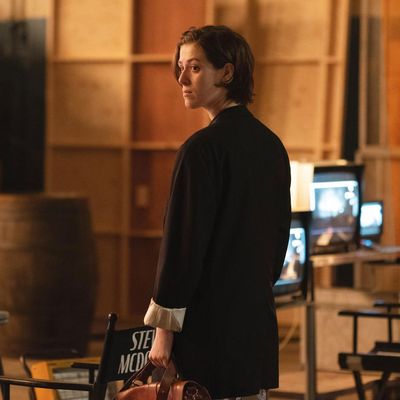
As luck would have it, my ticket for the Cannes premiere of The Souvenir Part II, the sequel to a movie I love, put me directly in front of the three women who made it possible: director Joanna Hogg, star Honor Swinton Byrne, and how-do-you-even-choose-a-noun Tilda Swinton, old pal of Hogg’s and mother offscreen and on- to Honor. In the half-second after the lights went down, I heard one of them whisper, “Just enjoy it.” It was an almost inappropriately intimate thing to overhear, tinged with an air of mystery — who said it, and to whom? In other words, it was a moment perfectly pitched to the tenor of the Souvenir movies, which, now that there are two of them, we really need to think of a grandiose name for. The Souvenir saga? The Souvenir franchise? (Just like F9, Thursday night’s screening opened with the blaring of the Universal logo, an incongruous match for this small, quiet film.)
The original Souvenir, from 2019, was not a movie that seemed to immediately scream out for a sequel. It followed Julie (Swinton Byrne), a cluelessly privileged film student in 1980s London who was a near-direct stand-in for Hogg’s younger self. She fell in love with Anthony (Tom Burke), an arrogant and enigmatic older man who might have been a spy, or maybe just a junkie. We watched as Julie slowly faded away in the relationship, bending herself to suit Anthony’s whims, his frequent lies and awful temper. And then (spoiler alert) he died, leaving a void in Julie’s life — but also the possibility that she could be able to find herself again, and, having stepped out of her naïveté, might eventually turn into a real artist.
But Hogg didn’t stop living after her own lover’s death, and now she’s returned to the world of The Souvenir to track the next few years of Julie’s life. Hogg had always envisioned the project as a two-parter, though at the premiere, she mentioned that she regretted not filming the two halves back-to-back, which left her with the nagging feeling someone would come along and pull the plug. (Part one got great reviews, but was not an overwhelming financial success.) She also called Part II a film that could stand completely on its own without its predecessor, which I’m not sure is true — Anthony’s ghost looms large over the movie — but speaks to her confidence in her creation. This is a sequel that more than justifies its own existence; multiple critics here at Cannes have told me they prefer it to the original. (I wouldn’t go that far, but again: I absolutely love The Souvenir.)
Part II picks up the thread left dangling at the end of The Souvenir, only now, the emphasis is reversed. Back then, we saw Julie’s filmmaking ambitions fade into the background as her romance with Anthony subsumed everything else. Now she’s shaken in the wake of his death, a trauma she attempts to deal with by turning it into a mystery to be solved. But it’s Julie’s burgeoning creativity, a subplot last time, that takes center stage this time around. Having lived it herself, Hogg is clear-eyed about how difficult the process of turning pain into art — a step most movies about the creative process skip over in a montage — actually is. It’s not enough to have a vision; you need to know how to turn that vision into specific images, and, even more important, how to communicate that vision to your collaborators. It’s a tender, embarrassing process, but that only makes Julie’s faltering progress feel all the more monumental.
This maybe makes The Souvenir Part II sound impossibly dry and boring. It’s not — it’s funnier than the original, and looser, too. Richard Ayoade’s pretentious filmmaker, who stole a couple of scenes in part one, returns for an even bigger score, and Tilda’s concerned mother gets a wider range of notes to play, including an extended setpiece that reaffirms Hogg’s mastery of a quintessentially British mode of cringe comedy.
The sequel takes Julie’s story up to the end of the 1980s, and as the decade turned over, I found myself wishing that the Souvenir movies might become the new Before series. We’d check in with Julie over the years, seeing her artistic progress, wondering which pivotal world events would take place in the background this time. The movie’s real ending would seem to close the door on that possibility — in its own way, it’s even more definitive than part one’s — but if this is the end of the Souvenir story, it’s going out triumphantly. As did Hogg and Swinton, lifelong friends and collaborators who wrapped each other up in a magnificent hug as the Cannes audience roared in applause. And I was there, smiling and clapping, basking in the glow of that friendship. And finally, once I convinced myself it wouldn’t ruin the moment, I took a picture:
More From France
- Jeremy Strong Practiced His Dad Jokes on Anne Hathaway
- Nitram Dares You Not to Look Away
- Colin Farrell Gets His Ex Machina Dance Moment at Cannes


